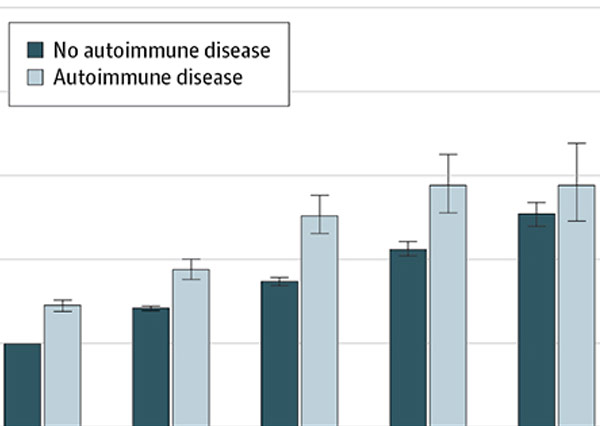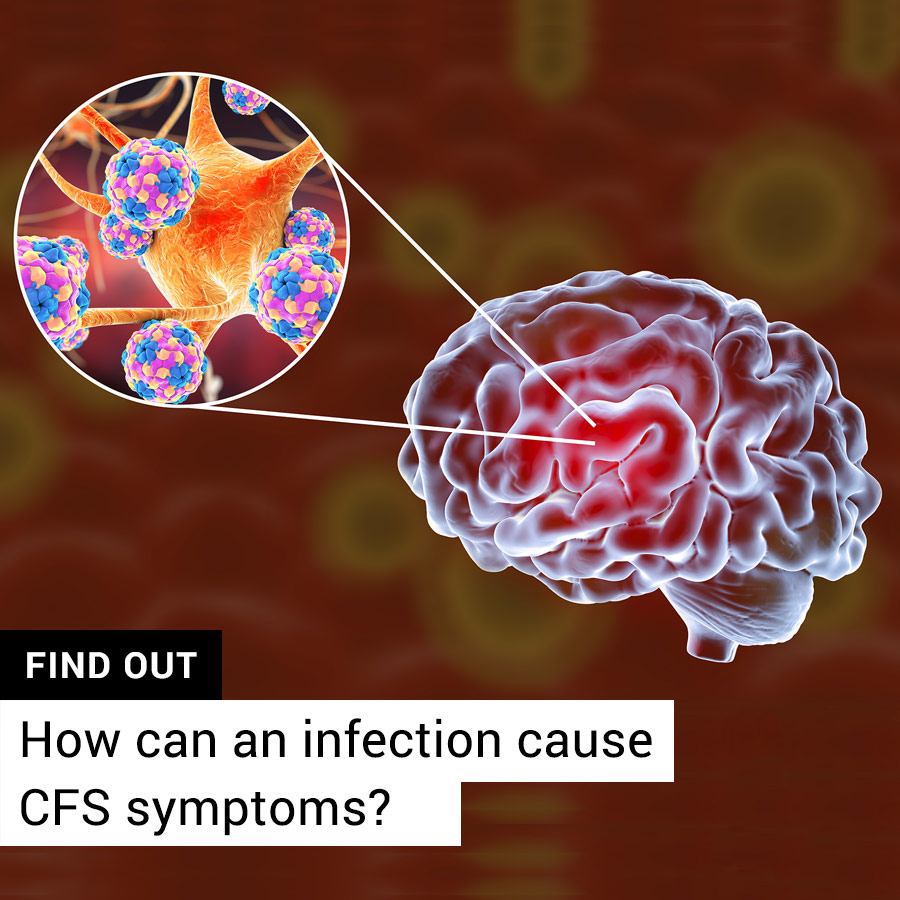Syndrome
Chronic fatigue: an immune dysfunction syndrome?
Not surprisingly, CFS is often referred to as an immune dysfunction syndrome. It frequently appears in people who have been sick. An estimated 50% to 70% of patients with chronic fatigue syndrome report that their symptoms started after they had a viral-like illness 2 or infection. 3
Furthermore, a significant number of CFS patients have other immune or autoimmune diseases, such as fibromyalgia or Hashimoto’s disease. And, these individuals frequently have a family history of autoimmune disease. 4
In 2019 researchers reported, “For the first time, we have shown that people who are prone to develop a CFS-like illness have an overactive immune system, both before and during a challenge to the immune system.” 5
These findings add to the “growing weight of scientific evidence which indicates that the body’s immune system is playing an important role in the causation of CFS,” wrote Dr. Charles Shepherd, medical advisor at the ME Association. 5
Immune system in overdrive
Other researchers have come to similar conclusions. Russell and colleagues have suggested that their study supports “the hypothesis that abnormal immune mechanisms are important in CFS.” 6
So, what would cause the immune system to malfunction and trigger CFS symptoms? There are multiple theories. The latest science indicates, however, that infections play a pivotal role. For some individuals, “infections throw a wrench in the immune system’s ability to quiet itself after the acute infection.” Instead, “the immune response becomes like a car stuck in high gear.” 7
This ongoing revving of the engine can be damaging, creating inflammation in the central and peripheral nervous system. An immune dysfunction may then trigger the onset of chronic fatigue syndrome symptoms, which can sometimes cause severe disability.
CFS symptoms can fluctuate, vary in intensity and appear either suddenly or gradually. Many patients complain of “brain fog.” This is described as slow thinking, difficulty focusing, and forgetfulness.
Although there is no single laboratory test that can diagnose chronic fatigue syndrome, the Cunningham Panel™ has been utilized by clinicians to help determine whether symptoms associated with CFS could be due to an underlying infection-triggered autoimmune process.
- https://www.sciencedirect.com/science/article/pii/S1568997218300880?via%3Dihub Franziska Sotzny, Julià Blanco, Enrica Capelli, Jesús Castro-Marrero, Sophie Steiner, Modra Murovska, Carmen Scheibenbogen. Myalgic Encephalomyelitis/Chronic Fatigue Syndrome – Evidence for an autoimmune disease, Autoimmunity Reviews. Volume 17, Issue 6, 2018, Pages 601-609.
- https://translational-medicine.biomedcentral.com/articles/10.1186/s12967-018-1644-y Rasa, S. et al. Chronic viral infections in myalgic encephalomyelitis/chronic fatigue syndrome (ME/CFS). Journal of Translational Medicine. volume 16, Article number: 268 (2018).
- https://www.ncbi.nlm.nih.gov/pmc/articles/PMC6702656/ Blomberg J, Rizwan M, Böhlin-Wiener A, et al. Antibodies to Human Herpesviruses in Myalgic Encephalomyelitis/Chronic Fatigue Syndrome Patients. Front Immunol. 2019;10:1946.
- https://www.sciencedirect.com/science/article/pii/S0306453018301963 Alice Russell, Nilay Hepgul, Naghmeh Nikkheslat, Alessandra Borsini, Zuzanna Zajkowska, Natalie Moll, Daniel Forton, Kosh Agarwal, Trudie Chalder, Valeria Mondelli, Matthew Hotopf, Anthony Cleare, Gabrielle Murphy, Graham Foster, Terry Wong, Gregor A. Schütze, Markus J. Schwarz, Neil Harrison, Patricia A. Zunszain, Carmine M. Pariante, Persistent fatigue induced by interferon-alpha: a novel, inflammation-based, proxy model of chronic fatigue syndrome. Psychoneuroendocrinology. Volume 100, 2019, Pages 276-285.
- https://www.theguardian.com/society/2018/dec/17/chronic-fatigue-syndrome-could-be-triggered-by-overactive-immune-system Nicola Davis. The Guardian. Chronic fatigue syndrome 'could be triggered by overactive immune system.’ Dec. 17, 2018.
- https://www.ncbi.nlm.nih.gov/pubmed/30567628 Russel A. et al. Persistent fatigue induced by interferon-alpha: a novel, inflammation-based, proxy model of chronic fatigue syndrome. Psychoneuroendocrinology. 2019 Feb;100:276-285.
- https://www.eurekalert.org/pub_releases/2015-02/cums-sdr022315.php Scientists discover robust evidence that chronic fatigue syndrome is a biological illness. Columbia University's Mailman School of Public Health. Press release. February 2015.
- https://www.ncbi.nlm.nih.gov/pubmed/27127189/ Pendergrast T, Brown A, Sunnquist M, et al. Housebound versus nonhousebound patients with myalgic encephalomyelitis and chronic fatigue syndrome. Chronic Illn. 2016;12(4):292–307.
- https://bmcmedicine.biomedcentral.com/articles/10.1186/s12916-014-0167-5 Bakken I. et al. Two age peaks in the incidence of chronic fatigue syndrome/myalgic encephalomyelitis: a population-based registry study from Norway 2008-2012. BMC Medicine. volume 12, Article number: 167 (2014).

This study provides “unequivocal evidence of immunological dysfunction in ME/CFS.” 7
Learn more about how infections can trigger neuropsychiatric symptoms

Cunningham Panel™ helps identify an autoimmune disorder in child initially diagnosed with schizophrenia
Researchers describe a complex case involving a 15-year-old girl, who abruptly developed multiple neurologic and psychiatric symptoms.

Autoimmune diseases and severe infections as risk factors for mood disorders: a nationwide study
This nationwide, population-based, prospective cohort study examines the link between mood disorders, infections, and autoimmune disease.

Childhood infections can increase risk of mental illness in kids
Nationwide study finds both mild and severe infections can increase risk of mental disorders in children and adolescents.









